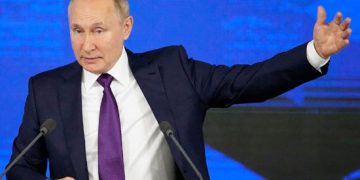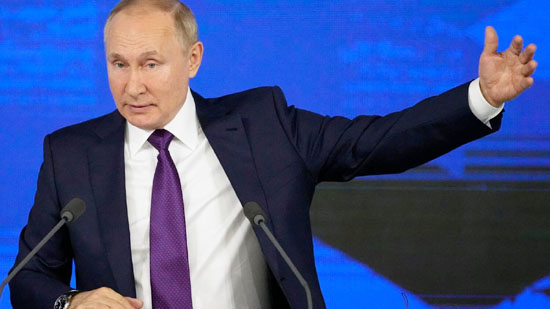Khaleej Times
Charles A Kupchan
During his annual press conference on December 23, Russian President Vladimir Putin railed against Nato enlargement. “How would the US react if we delivered rockets near their borders with Canada or Mexico?” he pointedly asked.
Putin’s increasingly combative rhetoric, coupled with Russia’s huge troop buildup on its border with Ukraine, suggests that the Kremlin is readying an invasion to pull the country back into Russia’s sphere of influence and prevent its accession to Nato. Europe could well be heading towards its deadliest interstate conflict since World War II.
But war is hardly foreordained, given the costs that Russia could face if it invaded its neighbour. Although Ukraine’s military forces are still no match for Russia’s, they would be far better at defending the country than they were in 2014, when Russia grabbed Crimea and intervened in the eastern Donbas region to support pro-Russian separatists. Russian aggression has alienated most Ukrainians, making widespread popular resistance likely if Russia tries to seize a major chunk of the country. Putin can expect not only heavy Russian casualties, but also the severe economic sanctions that the United States and its European allies are currently weighing.
With Russia facing such clear downsides if it opts for war, diplomacy has a reasonable chance of averting conflict. Indeed, Moscow recently released a detailed agenda for broad negotiations over European security. Even though many of Russia’s proposals are non-starters, the US and its European partners appear ready to engage, with the US hinting that talks with the Kremlin could begin early next year. In preparation, the Western allies should identify a combination of carrots and sticks that will increase the appeal of a diplomatic route to de-escalation while raising the prospective costs if Putin chooses war.
As for the carrots, Nato should reassure the Kremlin that it is not about to integrate Ukraine or turn the country into a forward outpost of the West’s best weaponry. Although Russia’s aggression against and coercion of its neighbour is unacceptable, its concern about a militarised Ukraine entering Nato is understandable. Major powers don’t like it when other major powers show up on their doorstep.
Even so, US President Joe Biden and his Nato counterparts are right to reject Putin’s demand for a guarantee that Nato will not offer membership to Ukraine. After all, one of the alliance’s core principles is that sovereign countries should be free to choose their geopolitical alignments.
In practice, however, Nato membership for Ukraine is not in the cards. Admitting it would not only provoke Russia, but also saddle the alliance with defending a nation that has a 2,414km border with Russia. Biden has already made clear that “school’s out” regarding Ukraine’s potential Nato membership and that sending US combat troops to the country is “not on the table”.
That reality creates a diplomatic opening. With admission to Nato requiring the consent of all members, Biden can credibly reassure Putin that membership for Ukraine is not up for consideration. And Nato members can provide assurances that they would put quantitative and qualitative limits on the weaponry they provide to Ukraine. Meanwhile, the alliance can, at least in theory, stand by its open-door policy. Such understandings may fall short of Putin’s demand for a codified guarantee, but they should be sufficient to ease his fears that Ukraine will become a Nato garrison on Russia’s southern frontier.
The US should also lead efforts to implement the Minsk Agreements – a roadmap negotiated in 2014 and 2015 to end Russia’s intervention in Donbas. That deal envisaged Ukraine granting a measure of regional autonomy to areas now controlled by Russian-backed separatists. In return, Russia would stop its proxy war, and Ukraine would regain control of Donbas.
Despite the best efforts of France and Germany, which helped to broker the Minsk deal, implementation has gone nowhere, as both Ukraine and Russia have dragged their feet. Washington should now team up with Paris and Berlin to push the Minsk process forward. While the West and Russia will probably have to agree to disagree about Russia’s illegal annexation of Crimea, the Minsk framework holds the promise of ending the conflict in eastern Ukraine, which has claimed well over 10,000 lives.
Should the Kremlin fulfil its Minsk obligations, the Western allies would scale back the economic sanctions imposed since 2014. And as they lean on Ukraine to uphold its Minsk commitments, they should also press the government in Kyiv to implement anti-corruption measures. Ukraine’s long-run welfare depends not just on ending Russian aggression, but also on reining in its oligarchs and cleaning up its politics.
Finally, Nato allies should capitalise on Russia’s offer to discuss broader issues of European security. Russia’s widening rift with the West has pushed it much closer to China, creating a coupling that emboldens both Putin and Chinese President Xi Jinping. But Russia is the junior partner and must be silently uncomfortable with China’s growing power and ambition, which provides the US and Europe with an opportunity to pull Russia westward.





